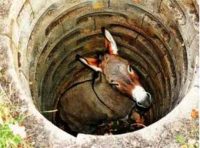Francis was born into a rich family. He enjoyed a very rich easy life growing up because of his father’s wealth and the permissiveness of the times. Francis was constantly happy, charming, and a born leader. If he was picky, people excused him. If he was ill, people took care of him. If he was so much of a dreamer he did poorly in school, no one minded. In many ways he was too easy to like for his own good. No one tried to control him or teach him. As he grew up, Francis became the leader of a crowd of young people who spent their nights in wild parties. Francis because of his fathers connection with France, loved the songs of France, the romance of France, and especially the free adventurous troubadours of France who wandered through Europe. And despite his dreaming, Francis was also good at business. But Francis wanted more than wealth but not holiness!
Francis wanted to be a noble, a knight. Battle was the best place to win the glory and prestige he longed for. He got his first chance when Assisi declared war on their longtime enemy, the nearby town of Perugia.
Most of the troops from Assisi were butchered in the fight. Only those wealthy enough to expect to be ransomed were taken prisoner. He was chained in a harsh, dark dungeon. All accounts say that he never lost his happy manner in that horrible place. Finally, after a year in the dungeon, he was ransomed. Strangely, the experience didn’t seem to change him. He gave himself to partying with as much joy and abandon as he had before the battle.
But Francis had a dream in which God told him he had it all wrong and told him to return home. And return home he did. What must it have been like to return without ever making it to battle, the boy who wanted nothing more than to be liked was humiliated, laughed at, called a coward by the village and raged at by his father. Francis’ conversion did not happen over night. God had waited for him for twenty-five years and now it was Francis’ turn to wait. Francis started to spend more time in prayer. He went off to a cave and wept for his sins. Sometimes God’s grace overwhelmed him with joy. But life couldn’t just stop for God. There was a business to run, customers to wait on. One day while riding through the countryside, Francis, the man who loved beauty, who was so picky about food, who hated deformity, came face to face with a leper. Repelled by the appearance and the smell of the leper, Francis nevertheless jumped down from his horse and kissed the hand of the leper. When his kiss of peace was returned, Francis was filled with joy. As he rode off, he turned around for a last wave, and saw that the leper had disappeared. He always looked upon it as a test from God that he had passed.
Despite great opposition from home Francis gave up his life of riches for one of simplicity and poverty. Soon Francis started to preach. (He was never a priest, though he was later ordained a deacon under his protest.) Francis was not a reformer; he preached about returning to God and obedience to the Church. Francis must have known about the decay in the Church, but he always showed the Church and its people his utmost respect. Slowly companions came to Francis, people who wanted to follow his life of sleeping in the open, begging for garbage to eat…and loving God. With companions, Francis knew he now had to have some kind of direction to this life so he opened the Bible in three places. He read the command to the rich young man to sell all his good and give to the poor, the order to the apostles to take nothing on their journey, and the demand to take up the cross daily. “Here is our rule,” Francis said — as simple, and as seemingly impossible, as that. He was going to do what no one thought possible any more — live by the Gospel. Francis took these commands so literally that he made one brother run after the thief who stole his hood and offer him his robe!
Francis’ always included all of God’s creation. Much has been written about Francis’ love of nature but his relationship was deeper than that. We call someone a lover of nature if they spend their free time in the woods or admire its beauty. But Francis really felt that nature, all God’s creations, were part of his being. The sparrow was as much his brother as the pope. In one famous story, Francis preached to hundreds of birds about being thankful to God for their wonderful clothes, for their independence, and for God’s care. The story tells us the birds stood still as he walked among him, only flying off when he said they could leave. Following the Gospel literally, Francis and his companions went out to preach two by two.
Francis years on became ill and never recovered from his illness. He died on October 4, 1226 at the age of 45. Francis is considered the founder of all Franciscan orders and the patron saint of animals, birds and ecologists.




